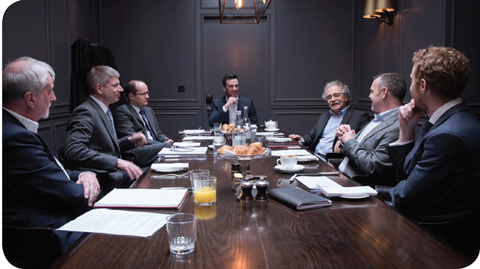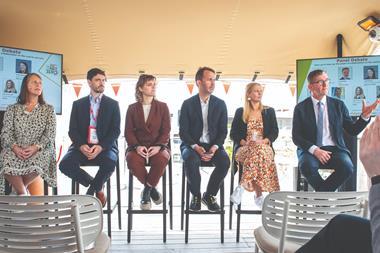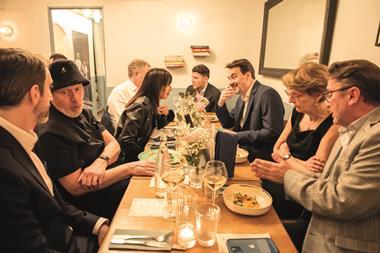The car park sector is at an interesting juncture. Driven by government policy around air quality as well as the rise in urban living, car trips in city centres are declining. On the other hand, the automotive sector is at the forefront of technological advances, presenting a huge opportunity for car park operators.
NCP brought together a panel of industry thought leaders to discuss the main issues.

Expert panellists
- Nigel Williams– managing director, Parking Matters
- Gary Lee– national car park manager, Savills
- Peter Grant– partner – investment and development, Montagu Evans
- Lee Holland– property director, NCP
- Graham Stephens– director – town planning, masterplanning and urban design, Stride Treglown
- Rick Rixson– director, Endurance Land
- Richard Williams– news content editor, Property Week (chair)
How can car park operators and developers best work together to achieve the optimal car park solution?
LH: We would like to get involved a little bit earlier in the process so we can help influence the development and implement our experience to push the customer requirement as opposed to just the development requirement. In most major cities we know, or have a good idea of, how the requirement for car parking stacks up. We find that in the majority of cases, the developer wants more parking than is actually required
GS: I think a lot of the size discrepancies are driven by local authorities. Parking standards that were set by county councils in 1976 are still being applied rigidly by some local authorities today. Developers are being forced, in some areas, into providing parking standards that don’t necessarily achieve what the current market is requiring. There seems to be prevalence by local authorities to ask for more parking than is actually required to serve office space. So there is a whole dichotomy going on. They need to look at how they apply their standards.
With central and local government policy on improving city centre air quality as well as enhanced public transport investment and a rise in urban living, has there been a reduction in city centre car parking demand?
LH: No, what is happening is that car volume is stabilising. It’s not growing but it’s not shrinking either. What the improved transport infrastructure is doing is bringing extra capacity as cities grow. A good example of that is Manchester. They have a good tram system, but the volume of car parking in the city centre has not changed. Why? Because customers want to park as close as they can to where they need to be.
GS: There does seem to be a shift towards car parks being moved to the edges of towns in support of the park-and-ride strategy rather than something that supports the city centre.
LH: That’s right but our customers tell us that when choosing a car park, it’s all about location.
On the retail side of things, how can landlords and car park operators work together to get the most value out of each parking space?
GL: There is a tendency for shopping centres and out-of-town retail parks to plan for the weeks around Christmas and have as many parking spaces as possible. But they need to think about the other 48 weeks of the year – how those spaces can be filled with pop-up stores and a bit more commercialisation.
The difficulty we see from a shopping centre perspective is how does the landlord maximise revenues from the car park? We are advising our shopping centre landlord clients that parking needs to be made more of an experience – not just something that customers drive up and park in but bringing more of the shopping centre into the car park so there is no physical boundary between the shopping centre and the car park.

GS: That’s right – it’s all about placemaking. It is important that we are looking at car parking stock in the city centres and thinking about mixed uses and converting some of the space to other uses. There are interesting ways of looking at the existing stock and getting more value out of it in the long term. That could be coming up with pop-up shops at the frontages, etc. Of course, it is only valuable if the rental income you get from a pop-up shop is higher than the rental income you get from the use as a parking space.
RR: The more the car park operator can be a leader in the mixed-use arena the more you will see a situation where all parties benefit, because those are the only deals that work. Everybody has to benefit for it to be successful. With the right information and data we can understand the operator’s requirements but equally identify the opportunities beyond the basic operation of the car park. The more we know the more we can perhaps find value.
GL: Another important consideration is getting technology in so people can find a space a bit quicker, allowing them to get into the shopping centre more quickly. Also introducing the technology so customers don’t have to worry about rushing back because their ticket is about to expire, but instead allowing them to pay on the go or once they are home so they don’t have to bother with a physical pay machine. That’s progression and will drive value.
That brings us nicely on to technology. How important is it that the car park sector embraces tech and innovations?
NW: In many ways the car park sector is already at the forefront of technological advances. It is going to be selling the first autonomous vehicles in 2021. The only places you will probably be able to use them are car parks. There are not going to be many places you will be able to drive autonomously – probably the motorways eventually but 2021 is not that far away.
GL: I agree. There’s a great opportunity for companies that manage shopping centres and car parks to lead the way in autonomous vehicles and their use; where the car can park itself. It gives the customer more time to enjoy the leisure destination or shopping centre or city centre without having to worry about parking. It’s a really good opportunity for us to lead the way in autonomous parking.
GS: In Cardiff they have issued a new parking app covering 3,500 car parking spaces around the city. Each has a sensor and you can effectively use an app to work out exactly where the available spaces are at any one point.

By 2025 they reckon all new cars are going to be internet enabled. It’s 50% already. It won’t be long before the car and the car park space will find each other. There will be a way where you program in where you want to go and the car will effectively take you to the nearest available car park space.
NW: You are going to see the same thing on the high street and on-street parking. The technology is going to come in. At the moment it’s more off-street because you have control of it but it is going to be a lot more generalised.
LH: There is always two sides to the coin. Some of these technologies have got a long way to go. Electric vehicle parking points are the same. We’ve had electric points in our car parks for 15 years and on average they have been used less than 2% of the time.
GS: Electric bays are an interesting point. They haven’t really taken off yet but we are advising our clients that if you are thinking about putting in, say, four electric bays, put in provision for 10 or 12 so you can bring them online when you need to. I think when it does come it will catch a lot of car park operators out.
”It won’t be long before the car and the car park space will find each other”
Graham Stephens, Stride Treglown
PG: It all comes down to customer experience. They want a safe, well-lit car park that is easy to get in and out of and where paying is easy. We are already seeing technological advances in the payment systems. With all the payment systems coming in, there is going to be all sorts of tariffs and deals going on and paying will be much more flexible and user friendly.
LH: It’s all valid and you have to have a mix of all these capabilities for your car park. It’s all about servicing the customer requirements. We have spent a lot of time at NCP thinking about the customer experience – particularly around payment and the methodologies and ease of use.
We will make sure, hopefully, that we are at the forefront of delivering a good service through different types of technology, through different types of apps, through different ways of interacting with customers. We have introduced Park Pass where customers can pre-pay or pay later. Park Pass is about customer data. We want to know who our customers are, when they park with us and why they park with us so we can service them better and make them offers that suit their needs.
All of that is about data and technology and then there are the broader technologies such as electric vehicles and autonomous vehicles at play. But just as important are things such as lighting, cleanliness and how you move around car parks and find the right spaces. It’s all about the customer journey. Our real focus is the end customer and that’s the way it should be.
.































No comments yet